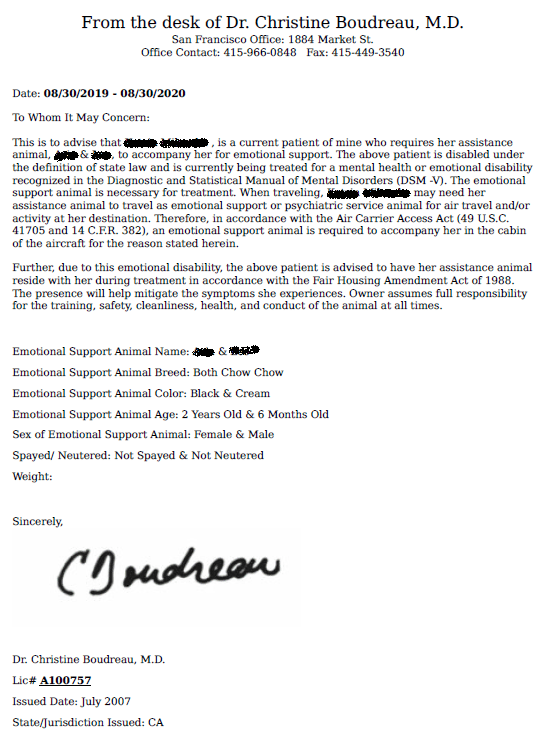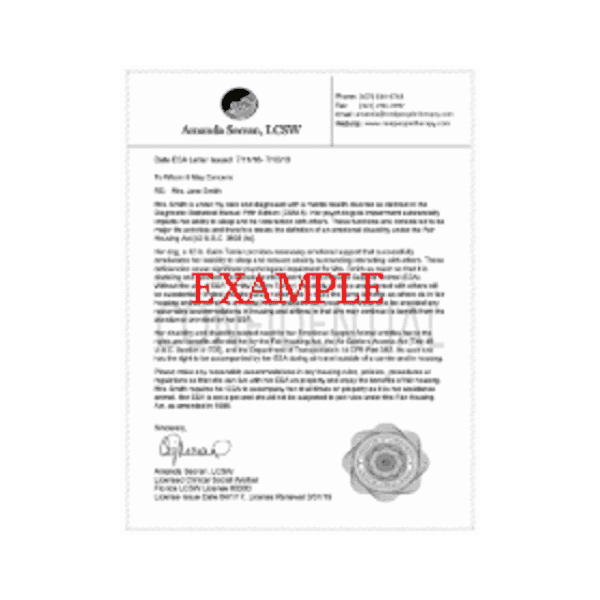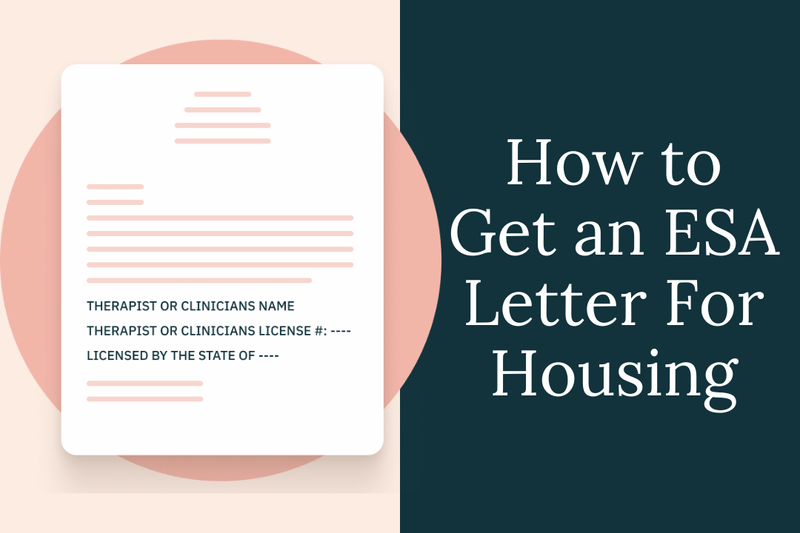Having an Emotional Support Animal (ESA) can be incredibly beneficial for individuals experiencing emotional or mental health challenges. However, many people are often unaware of the costs associated with obtaining an ESA letter, which is an essential document for accessing certain rights and privileges. In this article, we will explore the various costs involved in obtaining an ESA letter, including the fees charged by healthcare professionals and online services, as well as the potential expenses for housing and air travel. By understanding these costs, you can make informed decisions and ensure that you are well-prepared to support your emotional well-being with an ESA.

This image is property of fastesaletter.com.
Certification Process
Evaluating the need for an ESA
Before beginning the certification process, it is important to evaluate the need for an Emotional Support Animal (ESA). This involves assessing your mental health and determining if the presence of an ESA could provide you with emotional support and improve your overall well-being. It is recommended to consult with a licensed mental health professional who can properly evaluate your situation and determine if an ESA is appropriate for you.
Finding a licensed mental health professional
To obtain an ESA letter, you will need to find a licensed mental health professional who is qualified to assess your need for an ESA. This can be a psychiatrist, psychologist, therapist, or counselor. It is crucial to choose a reputable professional who understands the requirements for an ESA and can provide a comprehensive evaluation. You can start by asking for recommendations from your primary care physician or reaching out to mental health organizations in your area.
The cost of the evaluation
The cost of the evaluation for an ESA letter will vary depending on the mental health professional you choose and their specific fees. It is important to note that the evaluation process may involve multiple sessions, including an initial consultation and follow-up appointments. The fees for these sessions can range from $100 to $300 per session. Additionally, some professionals may charge an extra fee for documentation and processing the ESA letter. It is essential to inquire about the total cost beforehand to ensure you can budget accordingly.
Therapist Fees
Initial consultation fee
When seeking an ESA letter, you will typically have an initial consultation with the mental health professional to discuss your needs and evaluate your eligibility for an ESA. During this session, the therapist will gather information about your mental health history, symptoms, and current situation. The fees for the initial consultation can range from $100 to $200, depending on the professional's experience and location.
Therapy session fees
If the mental health professional determines that ongoing therapy sessions would benefit you in conjunction with the presence of an ESA, additional fees will apply. Therapy session fees can range from $75 to $200 per session, depending on factors such as location, duration, and the therapist's qualifications. These fees are separate from the evaluation fees for the ESA letter.
Follow-up appointments
In some cases, follow-up appointments may be necessary to monitor your progress and evaluate the effectiveness of the ESA. These appointments can be scheduled on a regular basis and may involve discussions about your overall well-being and any adjustments needed in your treatment plan. Follow-up appointment fees typically range from $75 to $150 per session.
Average costs
On average, individuals can expect to spend between $300 and $800 for the evaluation and therapy sessions associated with obtaining an ESA letter. However, it is important to remember that these costs can vary depending on the therapist's fees and the number of sessions required. It is essential to discuss the fees upfront with your therapist to ensure there are no surprises and to plan your budget accordingly.
Travel and Housing
Airlines and ESA fees
If you plan to travel with your ESA, it is important to be aware of the fees associated with flying. Each airline has its own policies and regulations regarding ESAs, and these policies may include specific fees. Some airlines charge a one-time fee for traveling with an ESA, while others require a fee for each leg of the journey. The fees can range from $75 to $200 per flight, depending on the airline and the destination.
Housing rental policies
When it comes to housing, individuals with ESAs may face different rental policies compared to those without animals. While some landlords and property managers are understanding and accommodating towards ESAs, others may have specific rules and regulations in place. It is crucial to inquire about any additional fees or deposits associated with renting a property with an ESA. Depending on the location and landlord, these fees can range from a few hundred dollars to several months' worth of rent.
Potential deposits or rent increases
In addition to the initial fees for housing with an ESA, some landlords may require a security deposit or increase the monthly rent. This is to account for any potential damages or wear and tear caused by the animal. The amount of the deposit or rent increase will vary from property to property, so it is essential to discuss these details with the landlord or property manager beforehand. It is recommended to document the condition of the property before moving in and upon moving out to prevent any disputes regarding damages.
Training and Obedience Classes
Basic training fees
Training your ESA is not only important for their well-being but also for your own. Basic training fees can vary depending on the type of training facility or professional you choose. Many pet stores and trainers offer group training classes that cover basic commands, socialization, and leash walking. These classes usually range from $50 to $150 for a set number of sessions.
Specifically tailored training
In certain cases, individuals with ESAs may require specialized training to address specific needs or behaviors. This can include anxiety management, behavior modification, or tasks specifically related to your mental health condition. Specifically tailored training may involve working with a professional who specializes in ESA training or a certified service dog trainer. The fees for this type of training can range from $100 to $300 per session, depending on the trainer's expertise and location.
Obedience classes
While basic training focuses on essential commands and behaviors, obedience classes can provide additional training and socialization opportunities for your ESA. These classes are typically available for dogs and can help reinforce good behavior, improve focus, and enhance the bond between you and your ESA. Obedience class fees can range from $100 to $250, depending on the duration of the class and the training facility.

This image is property of www.seattlemet.com.
Gear and Equipment
Leashes, collars, and harnesses
When it comes to gear and equipment for your ESA, there are several items you may need to purchase. Leashes, collars, and harnesses are essential for managing your ESA during walks and outings. The cost of these items can range from $10 to $50, depending on the brand and quality you choose. It is important to select sturdy and reliable gear that ensures the safety and comfort of your ESA.
Vest or identification materials
To clearly identify your ESA, you may need to invest in a vest or identification materials that designate your animal as an emotional support animal. These items typically include patches or tags that can be attached to the animal's vest or collar. The cost of a suitable vest or identification materials can range from $15 to $50, depending on the design and customization options.
Transportation carriers
If you plan to travel with your ESA using public transportation or in a vehicle, a transportation carrier will be necessary. The cost of transportation carriers can vary depending on the size and quality of the carrier. For example, a comfortable and secure carrier for a small dog can cost between $30 and $100, while carriers for larger dogs may range from $50 to $200.
Pet supplies and grooming
In addition to the specific gear mentioned above, it is important to consider the general pet supplies and grooming needs for your ESA. This can include food and water bowls, bedding, toys, grooming tools, and hygiene products. The cost of these supplies can vary depending on the type and brand you choose. On average, individuals can expect to spend between $100 and $300 on initial pet supplies and grooming items for their ESA.
Veterinary Care
Initial vaccinations and exams
Just like any other pet, your ESA will require regular veterinary care, starting with initial vaccinations and exams. These initial veterinary visits are essential to ensure your ESA's overall health and well-being. The cost of vaccinations and exams can vary depending on your location and the specific veterinary clinic. On average, initial vaccinations and exams can cost between $100 and $300.
Routine check-ups and preventive care
To keep your ESA in good health, routine check-ups and preventive care are necessary. These routine visits may include physical examinations, vaccinations, blood tests, and parasite prevention. The cost of routine check-ups and preventive care will depend on the veterinary clinic and any recommended procedures or medications. On average, individuals can expect to spend between $200 and $500 per year on routine veterinary care for their ESA.
Emergency visits and procedures
Unexpected health issues or emergencies can occur, and it is important to be prepared for potential veterinary expenses. Emergency visits and procedures can be costly, depending on the severity of the situation and the required treatments. It is recommended to have an emergency fund or consider pet insurance to help offset these unpredictable expenses. The cost of emergency visits and procedures can range from a few hundred dollars to several thousand dollars, depending on the treatment needed.
Prescription medications and treatments
Depending on your ESA's specific health needs, they may require prescription medications or treatments. These can include medications for anxiety, depression, or other mental health conditions, as well as medications for common physical ailments. The cost of prescription medications and treatments can vary depending on the medication and dosage prescribed. On average, individuals can expect to spend between $50 and $200 per month on these ongoing expenses.

This image is property of medvidi.com.
Pet Insurance
Monthly premiums
Considering the potential healthcare costs for your ESA, pet insurance can be a valuable investment. Pet insurance helps cover the costs of veterinary care, including routine visits, emergency care, medications, and treatments. Monthly premiums for pet insurance will vary depending on the coverage plan, your location, and the age and breed of your ESA. On average, individuals can expect to pay between $30 to $60 per month for pet insurance.
Coverage and exclusions
It is important to thoroughly review the coverage and exclusions of any pet insurance policy before enrolling. Different insurance providers offer various levels of coverage, and some may have exclusions for pre-existing conditions or breed-specific health issues. It is essential to compare the policies and choose one that best suits your ESA's specific needs and your budget.
Limits and deductibles
Pet insurance policies often have limits on the maximum payout per incident or per year. These limits can vary depending on the policy and provider. Additionally, pet insurance policies may have deductibles, which are the amount you must pay out of pocket before the insurance coverage kicks in. It is crucial to understand these limits and deductibles to ensure you are adequately covered and aware of any potential additional costs.
Legal and Administrative Costs
Legal documentation and registration
Obtaining and maintaining legal documentation and registration for your ESA may involve certain costs. This can include fees for acquiring an ESA letter, obtaining a service animal identification card, or registering your ESA with an official registry. The costs for legal documentation and registration can range from $50 to $200, depending on the specific requirements and services you choose.
Assistance with housing and travel accommodations
In some cases, individuals may require legal assistance to navigate housing or travel accommodations with their ESA. Legal fees can vary depending on the complexity of the situation and the services provided by the legal professional. It is recommended to consult with a qualified attorney or legal expert who specializes in ESA-related matters to ensure you receive accurate guidance and support. The costs for legal assistance can range from $100 to $500 per hour, depending on the attorney's experience and location.
Appeals and dispute resolution
If you encounter challenges or disputes regarding your ESA and its rights, you may need to pursue legal avenues to protect your rights as an ESA owner. This can involve appeals processes, mediation, or dispute resolution through legal channels. The costs associated with appeals and dispute resolution can vary significantly depending on the complexity and duration of the proceedings. It is essential to consult with a qualified attorney or legal professional to assess the potential costs and make informed decisions regarding legal actions.

This image is property of serviceanimalbadge.com.
Time and Commitment
Training and socialization
As an ESA owner, it is important to invest time and effort into training and socializing your animal. This ensures their behavior is appropriate and aligned with their role as an ESA. Training and socialization involve setting aside regular periods for teaching commands, practicing obedience, and exposing your ESA to various environments and situations. The time commitment for training and socialization can vary depending on the individual and the specific needs of the ESA.
Daily care and exercise
ESAs require daily care, including feeding, grooming, exercise, and mental stimulation. The time needed to fulfill these daily responsibilities will depend on the type of animal and their specific needs. Dogs, for example, may require daily walks, playtime, and grooming. Cats may require social interaction, feeding, and litter box maintenance. It is important to allocate time each day to ensure your ESA receives the care and attention they need.
Emotional support and companionship
One of the main reasons for having an ESA is to provide emotional support and companionship. This requires dedicating quality time to bond with your ESA, offer affection, and engage in activities that promote well-being for both of you. This can include cuddling, playing, talking, or simply being present with your ESA. The time commitment for emotional support and companionship will vary depending on your needs and the needs of your ESA.
Alternative Treatment Options
Traditional therapy vs. ESA
While traditional therapy can be an effective treatment option for mental health conditions, some individuals find additional benefit from having an ESA as part of their treatment plan. Traditional therapy typically involves regular sessions with a mental health professional to discuss emotions, thoughts, and work on coping strategies. Having an ESA can complement this therapy by providing constant companionship and emotional support.
Costs and effectiveness
When comparing the costs and effectiveness of traditional therapy and having an ESA, it is important to consider individual preferences and needs. Traditional therapy often involves ongoing fees for therapy sessions, whereas the costs of having an ESA are more spread out over time. The effectiveness of each option will vary depending on the individual and their specific mental health condition. It is recommended to discuss alternative treatment options with your mental health professional to determine the most suitable approach.
Considerations for individuals with limited resources
For individuals with limited financial resources, the costs associated with obtaining and caring for an ESA can be a significant consideration. It is crucial to weigh the potential benefits of having an ESA against the financial obligations involved. There may be alternative options available, such as low-cost therapy options or alternative forms of emotional support, for individuals who cannot afford the expenses associated with an ESA. It is important to explore these options and seek guidance from mental health professionals to make the best decision for your individual circumstances.
In conclusion, obtaining and caring for an Emotional Support Animal (ESA) involves various costs and considerations. From the initial evaluation process to the ongoing expenses for veterinary care, therapy sessions, and necessary supplies, it is important to plan and budget accordingly. Additionally, legal and administrative costs, as well as the time and commitment required for training and providing emotional support to your ESA, should be taken into account. It is essential to consult with licensed professionals, research available resources, and carefully weigh the benefits and challenges associated with having an ESA to make an informed decision that aligns with your needs and financial situation.

This image is property of assets-global.website-files.com.


